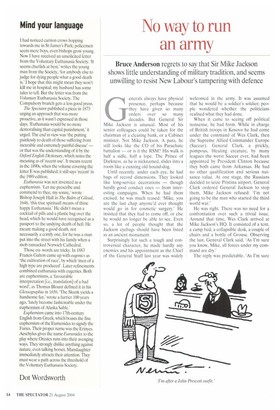Mind your language
I had noticed carrion crows hopping towards me in St James's Park; policemen seem mere boys, even bishops grow young. Now I have received an unsolicited letter from the Voluntary Euthanasia Society. 'It seems churlish at best,' writes the young man from the Society, 'for anybody else to judge for dying people what a good death is. I hope that this might mean they won't kill me in hospital; my husband has some tales to tell. But the letter was from the Voluntary Euthanasia Society. The Compulsory branch gets a less good press.
The Spectator published a piece in 1873 urging an approach that was more proactive, as it wasn't expressed in those days. 'Euthanasia would be no more demoralising than capital punishment,' it urged. The end in view was 'the putting painlessly to death of those suffering from incurable and extremely painful disease' — or that was the understanding of it by the Oxford English Dictionary, which notes the meaning as of 'recent use'. It means recent in the 1890s, when the volume covering the letter E was published; it still says 'recent' in the 1989 edition.
Euthanasia was not invented as a euphemism. 'Let me prescribe and commend to thee, my sonne,' wrote Bishop Joseph Hall in The Balm of Gilead, 1646, 'this true spirituall means of thine happy Euthanasia.' He didn't mean a cocktail of pills and a plastic bag over the head, which he would have recognised as a passport to the undying death of hell. He meant making a good death, not necessarily a comfy one, for he was a man put into the street with his family when a mob ransacked Norwich Cathedral.
Those euwords are tricky. In 1883 Francis Galton came up with eugenics as 'the cultivation of race', by which 'men of a high type are produced'. Later refinements combined euthanasia with eugenics. Both are euphemisms, a 'favourable interpretation [i.e., translation) of a bad word', as Thomas Blount defined it in his Glossographia in 1656. 'The Skunk yields a handsome fur,' wrote a furrier 100 years ago, 'lately become fashionable under the euphemism of Alaska Sable.'
Euphemism came into 17th-century English from Greek, which boasts the fine euphemism of the Eumenides to signify the Furies. Their proper name was the Erinyes. Aeschylus gives the name Eumenides to the play where Orestes runs into their avenging ways. They strongly dislike anything against nature, even talking horses. Manslaughter immediately attracts their attention. They must wear a path across the threshold of the Voluntary Euthanasia Society.


























































 Previous page
Previous page